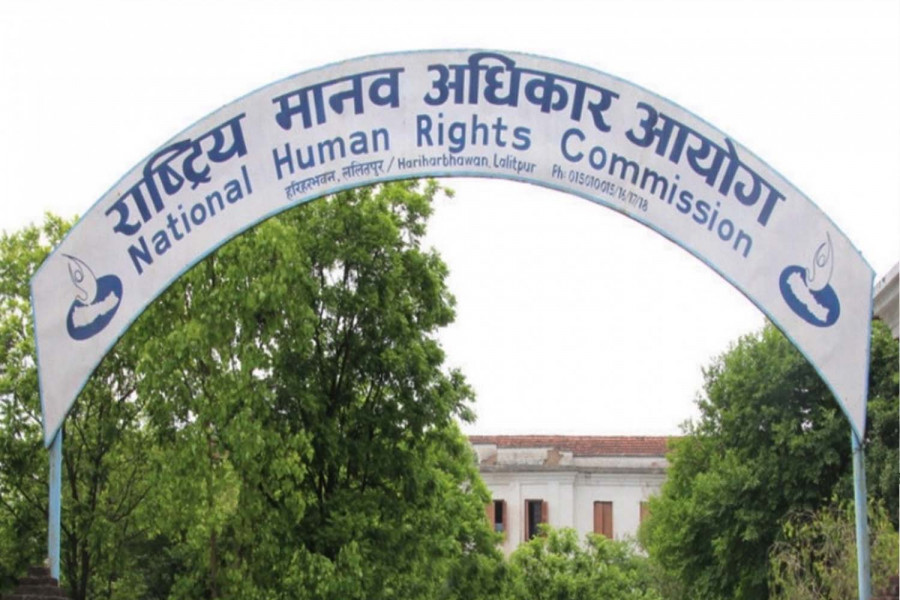National
National Human Rights Commission stares at a lower global status
Downgrade recommendation by global alliance of rights bodies takes effect after a year.
Binod Ghimire
The National Human Rights Commission (NHRC ) is on the verge of losing its “A” status in the global ranking as an accreditation committee of the Global Alliance of National Human Rights Institutions (GANHRI) has recommended its downgrade.
After holding a review for two consecutive years, the sub-committee on accreditation (SCA) of the global alliance has recommended downgrading the national human rights watchdog to “B” status. “The SCA recommends that the NHRC be downgraded to B status,” reads the decision from the sub-committee released on Tuesday. “In accordance with the GANHRI Statute, a recommendation to downgrade does not take effect for a period of a year.”
This means the NHRC still has a year to provide documentary evidence to establish its compliance with the Paris Principles, which the rights watchdog body has been failing for the last two consecutive years.
The alliance had expressed serious concerns over the appointments on February 3 last year of chairperson and members of the commission. The umbrella body of human rights institutions from 127 countries sought the NHRC’s response over the appointments and warned that it could review the “A” status enjoyed by the Nepali rights watchdog.
The accreditation committee’s decision to downgrade was taken after the constitutional body failed to justify that the appointments were done in line with Nepal’s domestic laws and essential requirements of the Paris Principles including the need for an open, transparent, and participatory process with broad consultations.
Similarly, it has also raised questions over the commission's ability to demonstrate adequate efforts in addressing in a timely manner human rights issues such as discrimination against women, caste, indigenous, LGBTQ and minorities, nor has it spoken out in a manner that promotes and protects all human rights in line with the Paris Principles.
Adopted in 1993 by the United Nations General Assembly, the Paris Principles set six criteria that national human rights institutions need to follow. These include autonomy from the government and the independence guaranteed by the constitution besides adequate competence, pluralism and the availability of resources and powers to carry out investigations.
President Bidya Devi Bhandari on February 3, 2021 had appointed the chair and four commissioners based on the recommendations from the Constitutional Council without going through hearings in the absence of Parliament. The council recommended them after a controversial amendment to the Constitutional Council (Functions, Duties, and Procedures) Act through an ordinance on December 15, 2020.
At least half a dozen writ petitions challenging the ordinance, recommendations of the council and the appointments are sub judice in the Supreme Court. Around two years since the filing of petitions, the Constitutional Bench of the apex court is yet to prioritise them for hearing.
In a review on October 28 last year, the alliance rejected NHRC’s claim that its chairperson and members were selected in line with Nepal’s international obligations. However, before downgrading the NHRC’s status, the alliance decided to wait for a year, expecting the Supreme Court to decide on the petitions challenging the appointments.
But after the Supreme Court failed to clear the case in a year, the sub-committee concluded that it needed to be downgraded in global rankings.
Former officials at the commission said the wait of a year is just a formality as per GANHRI’s statute. “The NHRC will be downgraded to B next year as the sub-committee on accreditation has made the recommendations after a long review. It can be stopped under two conditions: First, if the chairperson and its members tender their resignation, or the Supreme Court scraps their appointments,” Bed Bhattarai, a former secretary of the commission, told the Post. “It is unfortunate that the “A” status the commission had maintained since its formation 21 years back is being lost.”
Bhattarai said only the country whose human rights commission is listed in the “A” grade can put forth its opinion in deliberations at the Human Rights Council and take part in voting on any of its decisions. Similarly, only such countries can contest or vote for the leadership position in GANHRI or Asia Pacific Alliance of the Human Rights Institutions.
The “A” status of the commission is one of the key factors that helped Nepal be a member of the UN Human Rights Council for the second consecutive term, according to him.
“A downgrade would give a message that the human rights situation in Nepal is not satisfactory,” said Bhattarai.
Commission officials, however, say the decision of the sub-committee is unsatisfactory. “We have expressed our serious concern against the recommendation for downgrade. The decision is biased,” Surya Dhungel, a member of the commission, told the Post. “The NHRC will continue to enjoy the “A” status for a year until next year's review. We can work to retain the current status till that date.” He, however, failed to say how.




 10.12°C Kathmandu
10.12°C Kathmandu















